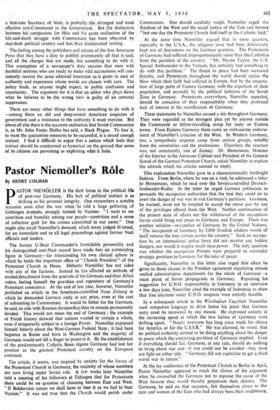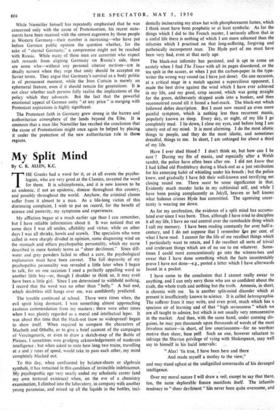Pastor Niemoller's Role
By HENRY COLMAR
pASTOR NIEMOLLER is the dark horse in the political life of post-war Germany. His lack of political instinct is as striking as his personal integrity. One remembers a notable occasion soon after the war when he told a large gathering of Gottingen students, strongly tainted by Nazism: " I want to see contrition and humility among our people—contrition and a sense of collective guilt for the crimes committed in our name." One might also recall Niemoller's demand, which many judged ill-timed, for an immediate end to all legal proceedings against former Nazi officials and leaders.
The former U-Boat Commander's formidable personality and his distinguished anti-Nazi record have made him an outstanding figure in Germany—far transcending his own clerical sphere in which he holds the important office of " Church President " of the Protestant Church in Hesse. Hitherto Niemoller has not sided with any of the factions. Instead he has affected an attitude of studied detachment from the quarrels of the Germans and their Allied rulers, feeling himself the guardian and repository of Germany's Protestant conscience. At the end of last year, however, Niemoller published an article in the American-controlled Neue Zeitung in which he demanded German unity at any price, even at the cost of submitting to Communism. It would be better for the Germans, he said, to side with Russian dictatorship than to remain permanently divided. This would not mean the end of Germany ; the example of Polish history showed that nations wanted to remain a whole, even if temporarily subject to a foreign Power. Niemoller expressed himself bitterly about the West-German Federal State ; it had been begotten in Rome and born in Washington and the majority of Germans would not lift a finger to preserve it. By the establishment of the predominantly Catholic Bonn regime Germany had lost her position as the greatest Protestant country on the European continent.
The article, it seems, was inspired by anxiety for the future of the Protestant Church in Germany, the majority of whose members are now living under Soviet, rule. A few weeks later Niemoller told a meeting of his followers at Tfibingen that for Protestants there could be no question of choosing between East and West. " If Bolshevism comes we shall have to bear it as we had to bear Nazism." It was not true that the Church would perish under Communism. One should carefully weigh, Niemoller urged the freedom of the West and the social justice of the East and beware " lest one day the Protestant Church find itself in the Catholic fold."
At the same time Niemoller argued that in some quarters, especially in the U.S.A., the religious issue had been deliberately kept out of discussions on the German question. The Protestants of Germany had suffered disproportionately more than the Catholics from the partition of the country. " Mr. Myron Taylor, the U.S. Special Ambassador to the Vatican, has certainly had something to do with this partition." The threat to peace had been increased thereby, and Protestants throughout the world should realise the blow which their faith had suffered in Europe, first by the amputa- tion of large parts of Eastern Germany with the expulsion of their population, and secondly by the political isolation of the Soviet Zone in Germany. Protestants everywhere, Niemoller appealed, should be conscious of their responsibility when they professed lack of interest in the reunification of Germany.
These statements by Niemoller caused a stir throughout Germany. They were regarded as the strongest plea yet by anyone outside the Communist or fellow-travelling camp for unity on Eastern terms. From Eastern Germany there came an enthusiastic endorse- ment of Niemoller's criticism of the West. In Western Germany, too, a sympathetic response came from certain groups, notably from the universities and the professions. Elsewhere the reaction was, not unnaturally, one of dismay. Dr. Heinemann, Minister of the Interior in the Adenauer Cabinet and President of the General Synod of the German Protestant Church, asked Niemoller to explain the attitude which his articles seemed to imply.
This explanation Niern011er gave in a characteristically forthright fashion. From Berlin, where he was on a visit, he addressed a letter to Heinemann, which he read over the Soviet-controlled Deutsch- landsender-Radio. In the letter he urged German politicians to persuade the occupation authorities that the best they could do to avert the danger of war was to end Germany's partition. Germans, he warned, must not be tempted to accept the status quo by any of the privileges offered from the West. Neither continuation of the present state of affairs nor the withdrawal of the occupation forces could bring real peace to Germany and Europe. There was another solution—occupation of Germany by the United Nations. " The occupation of Germany by 5,000 Swedish soldiers would of itself remove the iron curtain across the country." Such an occupa- tion by an international police force did not involve any hidden dangers, nor would it require much man-power. The only question was whether the occupation Powers were prepared to surrender strategic positions in Germany for the sake of peace.
Significantly, Niemoller in this letter also urged that effect be given to those clauses in the Potsdam agreement stipulating certain unified administrative departments for the whole of Germany—a main plank of Soviet propaganda in Germany. Repeating his suggestion for U.N.O. responsibility in Germany in an interview a few days later, Niemoller cited the example of Indonesia to show that free elections under U.N.O. auspices were entirely feasible.
In a subsequent article in the Wiesbadner Tageblatt Niemoller used outspoken language to drive home his point that German unity must be recovered by any means. He expressed anxiety at the increasing speed at which the two halves of Germany were drifting apart. " Nearly everyone has long since made his choice for America or for the U.S.S.R." He was alarmed, he wrote, that no political authority seemed to be doing anything about the danger to peace which the continuing partition of Germany implied. Even if everything should fail, Germans, at any rate, should do nothing to bring about war and—if war could not be avoided—they must not fight on either side. " Germany did not capitulate to get a third world war in return."
At the lay conference of the Protestant Church in Berlin in April, Pastor Niemoller appeared to reach the climax of his argument when he counselled the Germans not to espouse the cause of the West because they would thereby perpetuate their distress. The Germans, he said on that occasion, felt themselves closer to the men and women of the East who had always been their neighbours.. While Niemoller himself has repeatedly emphasised that he was concerned only with the cause of Protestantism, his recent state- ments have been received with the utmost eagerness by those people in Western Germany—their number is increasing—who have put before German public opinion the question whether, for the sake of " eternal Germany," a compromise might not be reached with Russia. While many of these men are careerists who expect rich rewards from aligning Germany on Russia's side, there are some who—without any personal ulterior mctives—are in deadly earnest when they urge that unity should be accepted on Soviet terms. They argue that Germany's survival as a body politic is of permanent moment, while the Iron Curtain is merely an ephemeral feature, even if it should remain for generations. It is not clear whether such persons fully realise the implications of the policy which they advocate. But the fact that the powerful emotional appeal of German unity " at any price " is merging with Protestant aspirations is highly significant.
The Protestant faith in Germany grew strong in the barren and authoritarian atmosphere of the lands beyond the Elbe. It is ominous that a man like Niemoller has reached the conclusion that the cause of Protestantism might once again be helped by placing it under the protection of the new authoritarian rule in those regions.







































 Previous page
Previous page